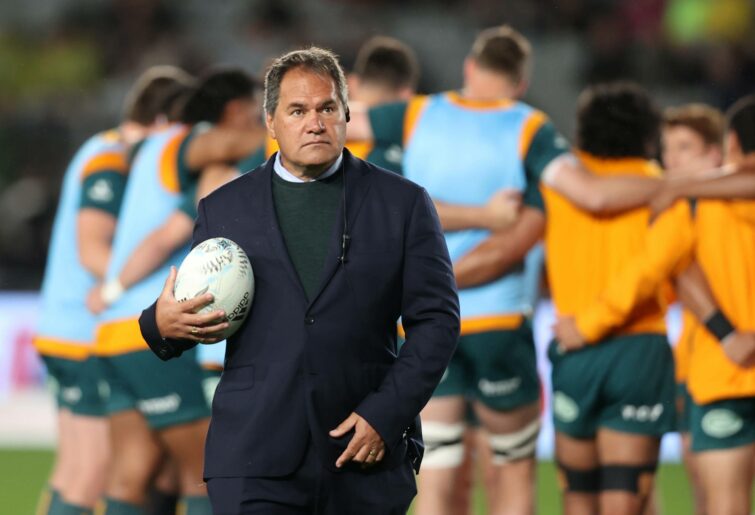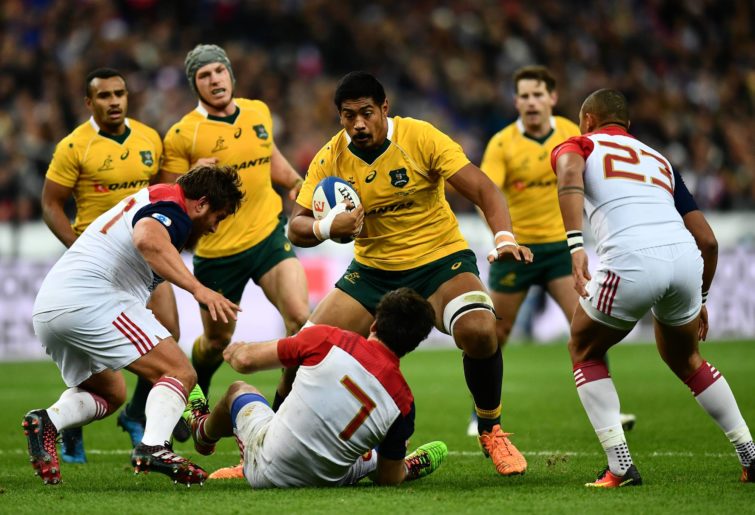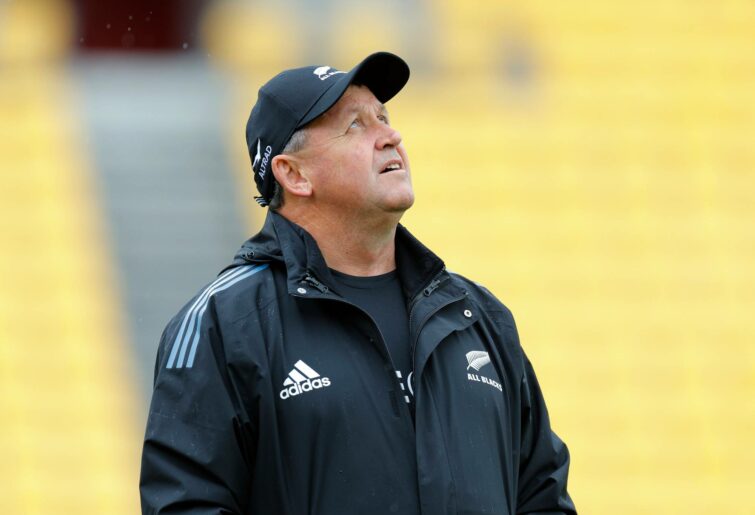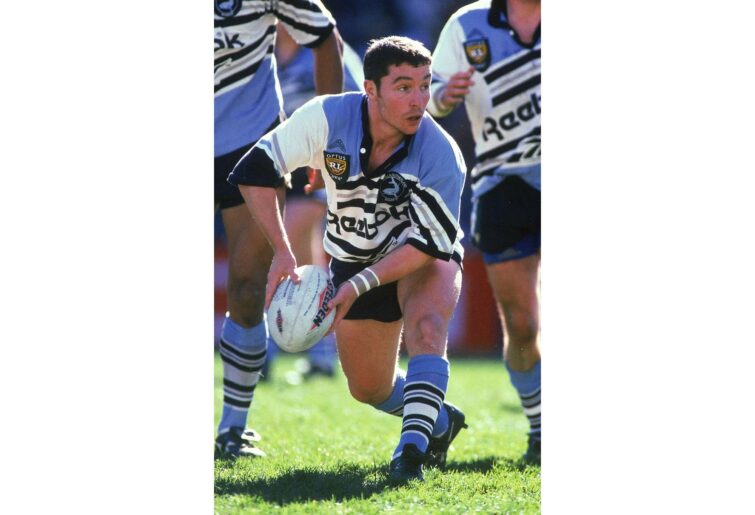Rugby tours to the northern hemisphere are tough enough at the best of times. Tougher still when you’re 11 months out from a World Cup and starting to feel the pressure that comes with not having bedded down the players and combinations that are going to get the job done in France.
Dave Rennie’s Wallabies have been world beaters this year in having a stream of players drop by the wayside, but a swathe of late changes announced by All Blacks’ coach Ian Foster means that Australia isn’t alone in heading north with a compromised squad.
Both Rennie and Foster have come under fire for their poor winning records, but unless something incredibly calamitous happens over the next 4-5 weeks, no amount of shouting from the bleachers changes the fact that these tours are steps along the journey, as opposed to being the defining moment of their respective tenures.
For Rennie in particular, it’s a fascinating situation. A 2-3 result will see his Test career win ratio to 38.24 percent; almost unfathomable. And by design, Rennie’s schedule is demonstrably tougher than Foster’s, with the Wallabies due to front up to Ireland and France, rugby’s top two rated sides.
Despite the chain of injuries beyond Rennie’s control; despite the absence of an obvious, ready replacement; despite Rugby Australia being in no position to pay out Rennie’s contract early; despite almost all observers with a view into proceedings determining that Rennie is the right man for the job, another losing tour will serve to create more of the noise that makes forward progress even more difficult.

Wallabies head coach Dave Rennie. (Photo by Phil Walter/Getty Images)
It’s the kind of self-fulfilling angst that Australian rugby has become very accustomed to in recent years, albeit that it will add nothing positive to the World Cup effort.
By now, everybody knows the names of the missing troops. Space limitations prevent me from naming them all.
To be fair, there are ins as well; far fewer in number, but not importance. The return of Michael Hooper will be watched with intense interest.
Before his self-imposed hiatus, Hooper was the heart and engine of this team, and he will once again need to lead from the front, middle and back, no matter that the captain’s armband now sits with James Slipper.
With locking stocks particularly thin, big Will Skelton assumes extra importance, needing to transition from support act to main man, if the Wallabies are to be competitive.
Other new additions are graduates from Australia A’s winning series in Japan. This is exactly how a pathway should work; recognition and reward for effort and good form, and a chance for players like Ben Donaldson, Mark Nawaqanitawase, Langi Gleeson and Matt Gibbon to shift the dial from promising to required.
Months ago, when the tour schedule was finalised, Rennie might reasonably have expected his starting 23 for the World Cup to be 80 percent sorted, and that this series of matches would allow him to get game time into his preferred combinations, to provide a springboard from which to attack the World Cup.

(Photo by Dan Mullan/Getty Images)
Instead, he finds himself plugging gaps with players who otherwise would not have been in contention or, no matter what they do on tour, will not be at the World Cup.
Instead of propelling his side forward, Rennie is, at best, caught in a holding pattern, or at worst, in damage control. Not exactly the ideal way to be approaching Ireland and France. Nor Scotland, Italy and Wales for that matter.
No matter which players strip, the message will be the same. Keep energy and work-rate high, keep needless penalties to a minimum, and don’t immediately undo good work by switching off at the next restart.
If it is too much to expect to see long periods of the cohesive play that comes from familiarity, what isn’t unreasonable is to expect players to perform the basics well.
No matter what level of rugby, that’s always a sound place to start from.
New Zealand’s sights, not unexpectedly, will be set higher. To an extent, that’s always the case when it comes to the All Blacks, but it’s also reflective of the positive way they finished off the Rugby Championships, and their softer schedule.
Foster’s original tour selection held true to his promise of a transition away from mass interchanges and trying out new players from match to match, with bolters and new project players consigned to the ‘A’ tour.
This is a far more palatable situation than Australia’s. New front-row heroes Ethan De Groot, Samisoni Taukei’aho and Tyrell Lomax get a perfectly-timed opportunity to build on their already impressive season, and there will be another couple of chances to find out if Jordie Barrett and Rieko Ioane really are a viable, long-term centre combination.
As ever, New Zealand’s biggest threat is themselves. Can they continue to rein in their natural instinct to freewheel? Not because anybody wants to see their ball movement and counter-attacking game abandoned, but because that too often translates into something loose and far less desirable.
When the All Blacks play well, there is a tangible sense of balance; between the fancy stuff and the attritional; loose forwards working in narrow channels, knocking opponents over, coming forward to support their ball runners, not circling around behind the advantage line cleaning up disrupted attacks.
All of that implies that the All Blacks impose their world view on every Test match. Almost all of their recent losses are distinguished by their inability to do just that; ceding initiative to opponents who have figured out how to restrict and frustrate them.
Eddie Jones knows that script as well as anyone; he might even claim he wrote it and had it played out in Tokyo in 2019. In a month of great rugby, England versus New Zealand at Twickenham, on November 19th, stands out as a match not to be missed.
Just when all looked to be going swimmingly, Foster emerged late last week to announce that no fewer than seven players wouldn’t be on the plane to Japan. Less than ideal, but of that lot, only Folau Fakatava, suffering his second ACL rupture, appears to be of major concern.
The All Blacks’ woes at least provided an opportunity for Foster to explain that hooker Dane Coles would be absent due to a niggle. It was as if the words ‘Coles’ and ‘niggle’ had never before been used in the same sentence. Like ‘Lavanini’ and ‘card’; ‘Kerevi’ and ‘learnings’; ‘Raynal’ and ‘we play’.
On the upside, this provides Asafo Aumua with an opportunity to restate his claim for a regular All Black jersey; quite on the cards if he delivers more of the accuracy and aggression he displayed for Wellington in their impressive 26-18 win, away against Canterbury, in New Zealand’s NPC final.
At lot can happen in 27 years, and while ‘Suzie the waitress’ might have aged, she appears to have lost none of her touch, with news that both the visiting Glasgow and Ulster sides were ravaged by a mystery illness, forcing the postponement of their weekend URC matches against the Sharks and Lions.

Ian Foster (Photo by Hagen Hopkins/Getty Images)
Many feathers were ruffled; the visitors upset at falling ill, the hosts wondering how many and how ill, and if the rescheduling to a date when their Springboks wouldn’t be available, wasn’t all a tad too convenient.
A penny too for the thoughts of Laurie Mains, coach of the 1995 All Blacks, not afforded the luxury of a cancellation or a delay, after their loss to the Springboks in the final was widely attributed to many of the team playing with the effects of debilitating food poisoning.
Across the Tasman, the seedings for the final stage of the women’s World Cup were finalised. A quirk of the ‘three pool’ system means that, despite being the obvious stand-out, England only qualify as the third-ranked side into the quarters.
That’s bad news for Australia. It isn’t telling tales out of school to predict that, no matter their committed effort to grind out wins against Wales and Scotland, the Wallaroos’ World Cup journey ends in next weekend’s quarter-final.
The tournament has thrown up some sharp contrasts. There’s a welcome freshness and novelty which is enhanced by the spirit and goodwill shown by the players and fans. But despite many bright moments, the rugby itself has a sameness to it that, at times, stretches the friendship.
The women’s professional game is of course in its infancy, so any criticisms or concerns must be kept in perspective. But for now, game plans tend to mirror each other, and there are relatively few individual players with the athleticism, skill set and bravado to break the cookie-cutter mould.
In any case, it was left to other sports this week to go off script and do the heavy eyebrow raising. Miner and philanthropist Gina Reinhart discovered that Australian Netball’s Diamonds didn’t like the colour of her money, which ultimately led her to withdraw Hancock Prospecting’s $15m sponsorship to a cash-strapped sport that needs every cent it can find.
Explaining the player’s position, Diamonds captain Liz Watson spoke last week about “legacy”, and how “I think we just need to align Netball Australia with our values.”
That’s an interesting take on how the various roles within organisations are performed, and how it is assumed that one set of values takes precedence over other values and business needs.
Would those same players agree to an administrator pulling them aside at half-time for example, and being asked to align their style of play with that desired by the major sponsor?
In any event, the legacy that this group of players – who remember, are not employed in the traditional sense, but who are selected to represent their country at a point in time – imposes on their sport, is a deficiency in funds available for grass roots development and salaries for other players without a voice on the issue.
Something for the players to ponder while adding up all the ‘likes’ on their social media feeds.
One only wonders what would grass roots rugby participants around Australia would say to a delegation of Wallabies pulling Rennie aside before training this week in Edinburgh, telling him, ‘we need to talk about Santos?’
As ever these days, the concussion issue stayed forefront, with the revelation that ex-NRL player and coach Paul Green was diagnosed with CTE, following his recent untimely death.

Paul Green at the Sharks in the preliminary final of 1996. (Photo by Getty Images)
It is impossible to believe that the same scourge isn’t evident throughout the ranks of retired – and not so retired – rugby players. All of which only intensifies the pressure on everyone in the game to better understand the causes and shape agreeable and practical solutions.
To that end, it was interesting to hear Green’s widow Amanda, in announcing the diagnosis, congratulate the NRL “for the improvements they are making to the game in regards to concussion and protecting players from grassroots to the professional level.”
Whatever these “improvements” might be, rugby’s sights must surely be aimed far higher.
Even cricket got in one the act, with two-time winner, the West Indies, sent packing from the ICC T20 Cricket World Cup in what used to be known as the ‘minnow stage’.
That was before New Zealand – who in retrospect, appear to have been playing dead throughout their underwhelming lead-up matches – turned it on from the first ball and blew Australia off the SCG.
If anyone is fretting that rugby might be missing out in the weird and whacky misalignment stakes, just be patient. By this time next week another Wallaby or two will ruled out, Coles will be back on the niggle and a women’s World Cup rugby coach will finally come up with a tactic that isn’t slavishly modelled on the men’s game, but which specifically suits the skills and athletic capability of the players.
































































































